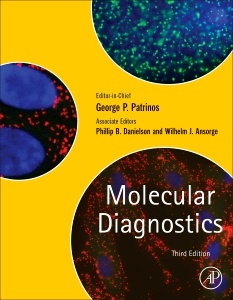Molecular Diagnostics (3rd Ed.)
Coordonnateurs : Patrinos George P., Ansorge Wilhelm, Danielson Phillip B.

Molecular Diagnostics, Third Edition, focuses on the technologies and applications that professionals need to work in, develop, and manage a clinical diagnostic laboratory. Each chapter contains an expert introduction to each subject that is next to technical details and many applications for molecular genetic testing that can be found in comprehensive reference lists at the end of each chapter.
Contents are divided into three parts, technologies, application of those technologies, and related issues. The first part is dedicated to the battery of the most widely used molecular pathology techniques. New chapters have been added, including the various new technologies involved in next-generation sequencing (mutation detection, gene expression, etc.), mass spectrometry, and protein-specific methodologies.
All revised chapters have been completely updated, to include not only technology innovations, but also novel diagnostic applications. As with previous editions, each of the chapters in this section includes a brief description of the technique followed by examples from the area of expertise from the selected contributor.
The second part of the book attempts to integrate previously analyzed technologies into the different aspects of molecular diagnostics, such as identification of genetically modified organisms, stem cells, pharmacogenomics, modern forensic science, molecular microbiology, and genetic diagnosis. Part three focuses on various everyday issues in a diagnostic laboratory, from genetic counseling and related ethical and psychological issues, to safety and quality management.
1. Molecular Diagnostics: Past, Present, and Future 2. Describing DNA Variants (Mutation Nomenclature) 3. Low- and Medium-Throughput Variant Detection Methods: A Historical Perspective 4. Quantitative Polymerase Chain Reaction 5. Integrated Polymerase Chain Reaction Technologies (Sample-to-Answer Technologies) 6. High-Resolution Melting Curve Analysis for Molecular Diagnostics 7. Molecular Techniques for DNA Methylation Studies 8. Perspectives for Future DNA Sequencing Techniques and Applications 9. Advanced Personal Genome Sequencing as the Ultimate Diagnostic Test 10. Application of Padlock and Selector Probes in Molecular Medicine 11. Advances in Microfluidics and Lab-on-a-Chip Technologies 12. Protein Diagnostics by Proximity Ligation: Combining Multiple Recognition and DNA Amplification for Improved Protein Analyses 13. Application of Proteomics to Medical Diagnostics 14. Molecular Cytogenetics in Molecular Diagnostics 15. Cytogenomics of Solid Tumors by Next-Generation Sequencing: A Clinical Perspective 16. Pharmacogenomics in Clinical Care and Drug Discovery 17. Nutrigenomics: Integrating Genomic Approaches Into Nutrition Research 18. DNA Microarrays and Genetic Testing 19. Bioinformatics Tools for Data Analysis 20. Genomic Databases: Emerging Tools for Molecular Diagnostics 21. Molecular Diagnostic Applications in Forensic Science 22. New Perspectives in Mass Disaster Victim Identification Assisted by DNA Typing and Forensic Genomics 23. Preimplantation Genetic Diagnosis 24. Noninvasive Cell-Free DNA Prenatal Testing for Fetal Aneuploidy in Maternal Blood 25. Genetic Testing and Psychology 26. Genomic Medicine in Developing Countries and Resource-Limited Environments 27. Public Understanding of Genetic Testing and Obstacles to Genetics Literacy 28. Safety and the Biorepository 29. Quality Assurance in Genetic Laboratories
Prof. Dr. Wilhelm Ansorge is a Senior Research Scientist and coordinator of the Biochemical Instrumentation Programme at the European Molecular Biology Laboratory in Heidelberg, Germany. His research interests include the development of the first complete Human Genome microarray, with numerous applications in gene expression studies and high-throughput Molecular Diagnostics.
Phillip B. Danielson is Professor of Molecular Biology at the University of Denver and is the Science Advisor for the National Law Enforcement and Corrections Technology Center - Rocky Mountain Region. He received research training at the University of Tokyo’s Department of Biochemistry and Biophysics, the University of Colorado at Boulder’s Department of Molecular, Cellular and Developmental Biology and the University of Denver’s Department of Biological Sciences. He currently oversees a forensic research and development program, serves as a forensic DNA consultant and also teaches courses in Forensic Science, Infectious Human Disease, Immunology and Molecular Biology. Danielson’s primary research focus is in the field of forensic genetics emphasizing the analysis and resolution of mitochondrial DNA mixtures and the use of comparative proteomics to facilitate the identification of biological stains. Together with the Colorado District Attorneys Council, the Office of the Alternate Defense Counsel and State Crime Laboratories, he has also developed training programs on the identification, collection and use of DNA evidence in criminal investigations. His work is fun
- Presents a comprehensive account of all new technologies and applications used in clinical diagnostic laboratories
- Explores a wide range of molecular-based tests that are available to assess DNA variation and changes in gene expression
- Offers clear translational presentations by the top molecular pathologists, clinical chemists, and molecular geneticists in the field
Date de parution : 11-2016
Ouvrage de 520 p.
21.4x27.6 cm
